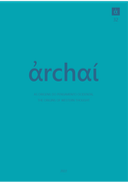SAFETYLIT WEEKLY UPDATE
SafetyLit Journal DetailsWe are unable to provide photocopies of any the articles and reports abstracted in SafetyLit updates. Where possible, links have been provided to the publisher of the material and contact information for the corresponding author is listed. Please consider asking your library to subscribe to the journals from which these abstracts have been gathered. |
|
Rev. ArchaiΑρχαί Abbreviation: Rev. ArchaiPublished by: Universidade de Brasília Instituto de Ciência Humanas Publisher Location: Brasilia, Brazil Journal Website:
Publication Date Range: 2008 -- Number of articles from this journal included in the SafetyLit database:
2 pISSN = 2179-4960
Journal Language(s): Portuguese, summaries in English and several other languages
|
|
